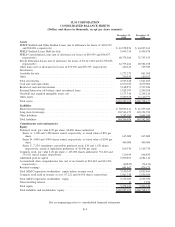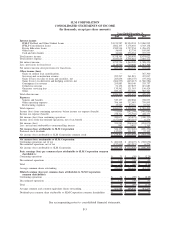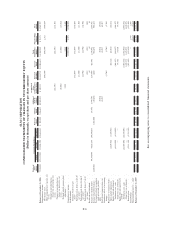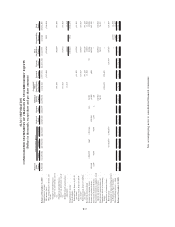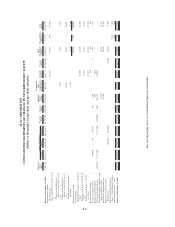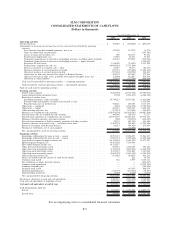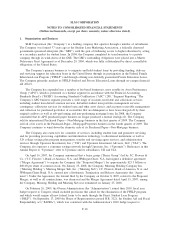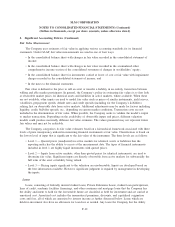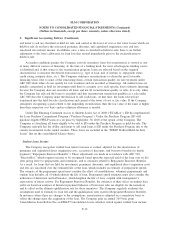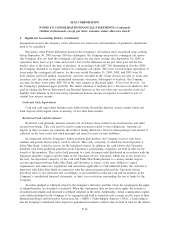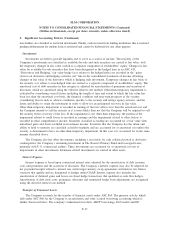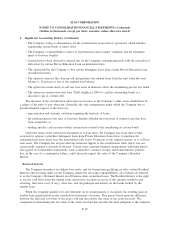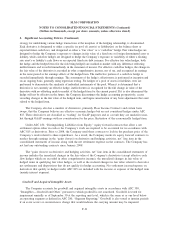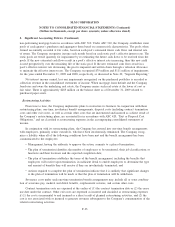Sallie Mae 2009 Annual Report Download - page 140
Download and view the complete annual report
Please find page 140 of the 2009 Sallie Mae annual report below. You can navigate through the pages in the report by either clicking on the pages listed below, or by using the keyword search tool below to find specific information within the annual report.2. Significant Accounting Policies (Continued)
and intent to sell are classified as held for sale, and carried at the lower of cost or fair value. Loans which are
held-for-sale do not have the associated premium, discount, and capitalized origination costs and fees
amortized into interest income. In addition, once a loan is classified as held-for-sale, there is no further
adjustment to the loan’s allowance for loan loss that existed immediately prior to the reclassification to
held-for-sale.
As market conditions permit, the Company actively securitizes loans but securitization is viewed as one
of many different sources of financing. At the time of a funding need, the most advantageous funding source
is identified and, if that source is the securitization program, loans are selected based on the required
characteristics to structure the desired transaction (e.g., type of loan, mix of interim vs. repayment status,
credit rating, maturity dates, etc.). The Company structures securitizations to obtain the most favorable
financing terms. Due to some of the structuring terms, certain transactions qualify for sale treatment under
ASC 860 while others do not qualify for sale treatment and are recorded as financings. All student loans are
initially categorized as held for investment until there is certainty as to each specific loan’s ultimate financing
because the Company does not securitize all loans and not all securitizations qualify as sales. It is only when
the Company has selected the loans to securitize and that securitization transaction qualifies as a sale under
ASC 860 does the Company make the decision to sell such loans. At that time, the loans selected are
transferred into the held-for-sale classification and carried at the lower of cost or fair value. If the Company
anticipates recognizing a gain related to the impending securitization, then the fair value of the loans is higher
than their respective cost basis and no valuation allowance is needed.
Under The Ensuring Continued Access to Student Loans Act of 2008 (“ECASLA”), ED has implemented
the Loan Purchase Commitment Program (“Purchase Program”). Under the Purchase Program, ED will
purchase eligible FFELP loans at a set price by September 30, 2010 at the option of the Company. The
Company is classifying all loans eligible to be sold to ED under the Purchase Program as held-for-sale. The
Company currently has the ability and intent to sell such loans to ED under the Purchase Program due to the
current environment in the capital markets. These loans are included in the “FFELP Stafford Held-for-Sale
Loans” line on the consolidated balance sheets.
Student Loan Income
The Company recognizes student loan interest income as earned, adjusted for the amortization of
premiums and capitalized direct origination costs, accretion of discounts, and borrower benefits for timely
payment (“Repayment Borrower Benefits”). These adjustments are made in accordance with ASC 310,
“Receivables,” which requires income to be recognized based upon the expected yield of the loan over its life
after giving effect to prepayments and extensions, and to estimates related to Repayment Borrower Benefits.
As a result, for loans that are held for investment, premiums, discounts, and capitalized direct origination costs
and fees are amortized over the estimated life of the loan, which includes an estimate of prepayment speeds.
The estimate of the prepayment speed must consider the effect of consolidations, voluntary prepayments and
student loan defaults, all of which shorten the life of loan. Prepayment speed estimates must also consider the
utilization of deferment and forbearance, which lengthen the life of loan, coupled with management’s
expectation of future activity. For Repayment Borrower Benefits, the estimates of their effect on student loan
yield are based on analyses of historical payment behavior of borrowers who are eligible for the incentives
and its effect on the ultimate qualification rate for these incentives. The Company regularly evaluates the
assumptions used to estimate its loan life and the qualification rates used for Repayment Borrower Benefits.
In instances where there are changes to the assumptions, amortization is adjusted on a cumulative basis to
reflect the change since the acquisition of the loan. The Company pays an annual 105 basis point
Consolidation Loan Rebate Fee on FFELP Consolidation Loans which is netted against student loan income.
F-13
SLM CORPORATION
NOTES TO CONSOLIDATED FINANCIAL STATEMENTS (Continued)
(Dollars in thousands, except per share amounts, unless otherwise stated)



